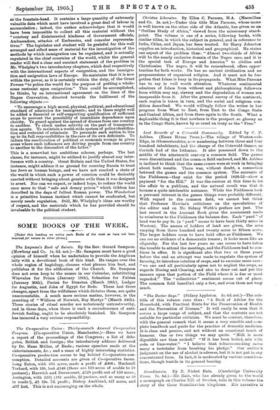Last Records of a Cotswold Community. Edited by C. P.
Ashbee. (Essex House Press.)—The village of Weston-sub- Edge, in Gloucestershire, now numbering between three and four hundred inhabitants, had the charge of the Cotswold Games, as Corinth had of the Isthmian. It also possessed down to the middle of the nineteenth century a common field. The games were discontinued and the common field enclosed, and Mr. Ashbee is inclined to think that the same causes were at work in bringing about both results. There was, without doubt, a connection betweed the games and the common system. The accounts of the Fieldsmen—they exist for the period 1826-52—show a. payment " for the Hill." It was the custom at this time to let the affair to a publican, and the natural result was that it. became a quite intolerable nuisance. While the Fieldsmen took a personal interest in the games things were probably different. With regard to the common field, we cannot but think that Professor Hewins's criticisms on the speculations of the editor and on Mr. Sidney Webb's preface are just. The last record in the Account Book gives the assessment made to reimburse to the Fieldsmen the balance due. Each " yard " of land was to pay 8s. (a •' yard" seems to have been thirty acres in Weston). The names of holders of land are given, the area varying from three hundred and twenty acres to fifteen acres. The larger holders seem to have held office as Fieldsmen. We can see no evidence of a democratic tenure ; it looks more like an oligarchy. For the last few years no one seems to have taken the trouble to attend the meetings, and the Fieldsmen had to con- tinue in office. It is significant also that two or three years before the end an attempt was made to regulate the system of farming, to introduce rotation of crops, and to exercise more care : "we one and all particularly agree not to neglect the crops, as regards Hoeing and Clearing, and also to draw out and put the manure upon that portion of the Field where it is due or most regarded." The " collectivist " sentiment seems out of place. The common field benefited only a few, and even them not very- much.










































 Previous page
Previous page